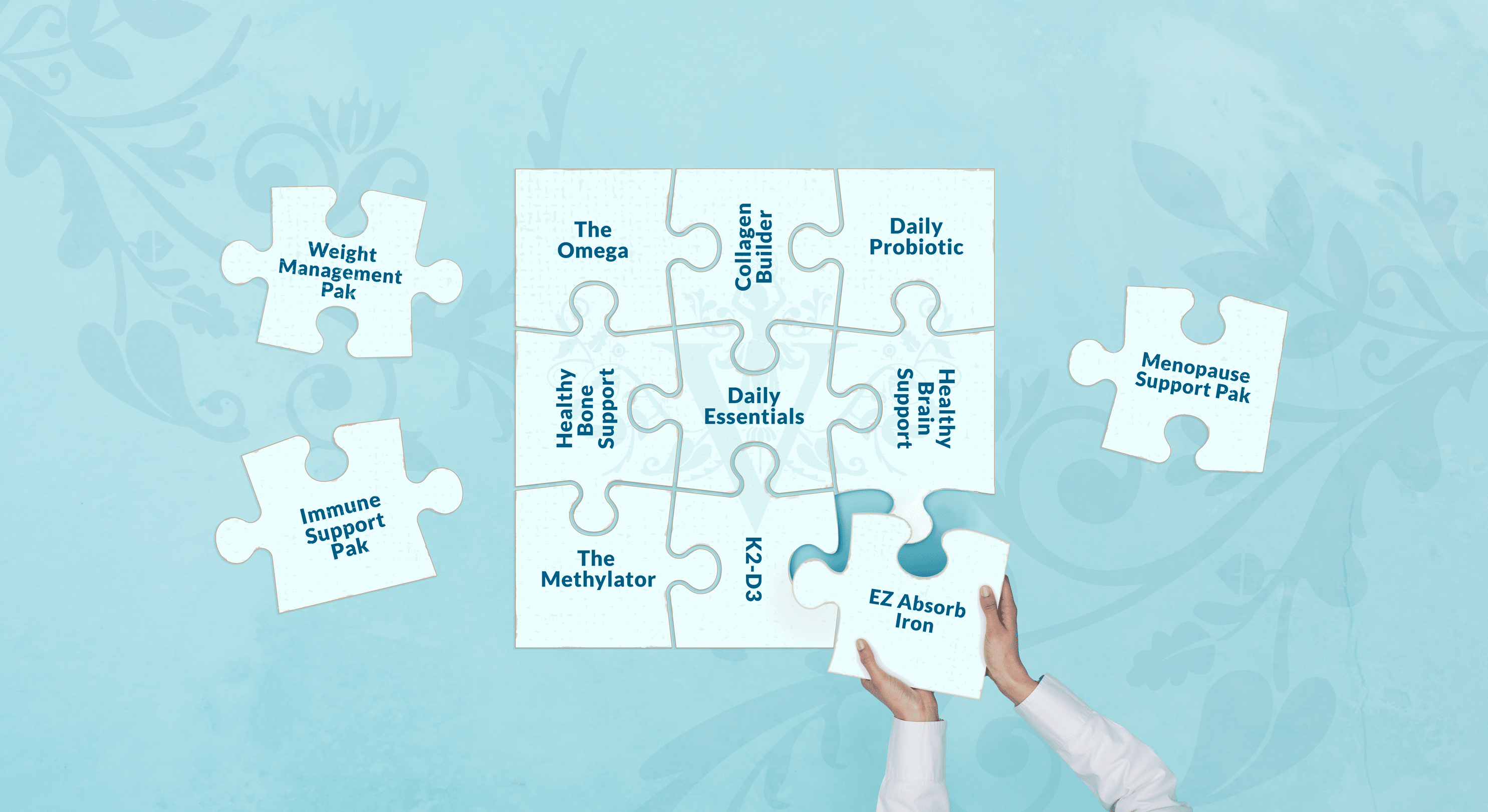

What is a Curated Vitamin Line?
The world’s first curated vitamin line, designed by a female physician. I took the few most common vitamin products that I found myself recommending to my patients over and over again and combined them into a small line of bundled product combinations (discounted from individual purchase) in an easy to understand, easy to choose vitamin line, that fit together beautifully. These high quality, pharmaceutical grade supplements are manufactured according to FDA standards, so you can be confident in the quality of your nutritional support.

A Message From Our Founder
As a Board Certified Ob/Gyn, and Minimally Invasive Gyn Surgeon (MIGS), practicing for almost 30 years, one of the most common questions I have gotten asked by my patients is how to choose quality vitamin supplements to maximize their health. At Virtuosa Vitamins, we teach that our food is our first "medicine" and that begins with a healthy diet based mostly on whole foods, with an emphasis on plants.
But let's face it. We don't all always get all the good nutrition we need from our food. Inevitably there are gaps in our nutrition, and these effect our health, our energy, and how we feel.
That's where Virtuosa Vitamins come in. We are here to fill the gaps. To provide the missing pieces to your nutritional puzzle.
It is a puzzle, isn't it? Myself? I'm completely overwhelmed when I start staring at the vitamin shelves in the store. Isle upon isle filled with shelves upon shelves of supplements. Even I get confused about what to take and what can and cannot be taken together! I'm not even a primary care giver and I can't tell you how many times I've had patients come into my office and dump out a mountain of vitamins, just for me to sort through with them to try to find which ones have duplicate ingredients or even dangerously high level of combined ingredients.
That's the second reason I created Virtuosa Vitamins. We aren't offering 1000 products. Just the ones you need the most, combined in thoughtful bundles (discounted from what you would pay individually for such high quality products) and designed to fit together with each other so that there are no overdosing overlaps. No unnecessary duplicate spending.
Like a puzzle.
Solved.
You're very welcome.
Now go live your best life....your Virtuosa life!
Love Always,
~Susan A Crockett, MD, FACOG
More Support and Resources Created by Dr. Crockett for You...
-

YouTube Show Host
Watch The Dr. Crockett ShowLorem ipsum dolor sit amet, consectetur adipiscing elit, sed do eiusmod tempor incididunt ut labore et dolore magna aliqua. Ut enim ad minim veniam, quis nostrud exercitation ullamco laboris nisi ut aliquip ex ea commodo consequat. Duis aute irure dolor in reprehenderit in voluptate velit esse cillum dolore eu fugiat nulla pariatur. Excepteur sint occaecat cupidatat non proident, sunt in culpa qui officia deserunt mollit anim id est laborum.
-

Podcaster
Listen to the Becoming Virtuosa PodcastLorem ipsum dolor sit amet, consectetur adipiscing elit, sed do eiusmod tempor incididunt ut labore et dolore magna aliqua. Ut enim ad minim veniam, quis nostrud exercitation ullamco laboris nisi ut aliquip ex ea commodo consequat. Duis aute irure dolor in reprehenderit in voluptate velit esse cillum dolore eu fugiat nulla pariatur. Excepteur sint occaecat cupidatat non proident, sunt in culpa qui officia deserunt mollit anim id est laborum.
-

Top 1% Minimally Invasive Gyn Surgeon
Book Your Appointment Today for a Consult with Dr. Crockett at Virtuosa GynLorem ipsum dolor sit amet, consectetur adipiscing elit, sed do eiusmod tempor incididunt ut labore et dolore magna aliqua. Ut enim ad minim veniam, quis nostrud exercitation ullamco laboris nisi ut aliquip ex ea commodo consequat. Duis aute irure dolor in reprehenderit in voluptate velit esse cillum dolore eu fugiat nulla pariatur. Excepteur sint occaecat cupidatat non proident, sunt in culpa qui officia deserunt mollit anim id est laborum.
FAQs
What vitamins should I be taking based on my age and health?
Always discuss your vitamin needs with a doctor before starting
any new supplement, especially if you have pre-existing health
conditions or are taking medications.
Depending on your age and health, you might consider taking vitamins and supplements to help with:
- Vitamin D Can help protect against age-related health problems like diabetes, heart disease, and certain cancers
Calcium Important for strong bones and teeth, especially for older people who are at risk of bone loss
Vitamin B12 Helps keep nerve and blood cells healthy, and protects against a type of anemia
Magnesium Plays a role in mood stabilization, immune function, and lowering inflammation
Omega 3 Found in fish oil, omega-3 fatty acids can help with heart health, brain function, and eye health
Vitamin B6 Helps form red blood cells, and can be found in potatoes, bananas, chicken breasts, and fortified cereals
Probiotics Can help keep the gut healthy, and may lower the risk of heart disease, diabetes, and stroke
Vitamin E Acts as an antioxidant to help neutralize free radicals that can damage cells
A multivitamin supplement formulated for people over age 50 can also help you meet your nutritional needs.
Can I get all the vitamins I need from diet alone?
Even a low-calorie diet can offer all essential vitamins and minerals apart from Vitamin D. It is advisable to use a Vitamin D supplement. To obtain the remaining nutrients through food, strategic planning and understanding of nutrition are required.
It's best to improve the diet before using supplements. Vitamins and minerals are most potent when sourced from food. In food, they are accompanied by various beneficial nutrients, like carotenoids, flavonoids, minerals, and antioxidants not found in most supplements.
Should I take a multivitamin or individual vitamins?
Whether you should take a multivitamin or individual vitamins depends on your health needs and goals:
- Multivitamins A good choice for maintaining optimal health, filling nutrient gaps, or for people with dietary restrictions. Multivitamins can be convenient and are formulated for different needs. However,
some multivitamins contain high doses of minerals that can cause side
effects like tooth staining, stomach bleeding, and confusion.
Individual vitamins A good choice if you have a deficiency or want to target specific health conditions. Individual vitamins can be more effective and may be better absorbed if taken at different times of the day. However, taking too many vitamins can cause side effects like nausea, vomiting, and stomach pain.
If you do take a multivitamin, you can try to find one that only contains the ingredients you're lacking. You can also take a few individual supplements if you're only deficient in one or two things.
What are the potential side effects of taking too much of a vitamin?
Too much vitamin C or zinc could cause nausea, diarrhea, and stomach cramps. Too much selenium could lead to hair loss, gastrointestinal upset, fatigue, and mild nerve damage.
Vitamin D, calcium, and folic acid and are three nutrients you may get too much of, especially through supplements.
Adults
who regularly far exceed the 4,000 international units (IUs) daily safe
upper limit for vitamin D might may end up with serious heart problems.
Folic
acid is added to enriched grain products -- white flours, pasta, rice,
breads, and cereals -- to help prevent birth defects in babies due to
folic acid deficiency in pregnant women. While folic acid fortification
has cut the number of birth defects by 25% to 50%, it might have created
other health concerns in people getting too much.
It's not hard
to get more than 1,000 micrograms of folic acid a day (the safe upper
limit for adults) from fortified foods and supplements on a regular
basis. Doing so might hide the signs of a vitamin B12 deficiency in older adults. Vitamin B12 deficiency can sometimes lead to permanent nerve damage if left untreated.
How do I know if I'm deficient in a certain vitamin?
You can check for vitamin deficiencies by getting a blood test or taking an at-home vitamin deficiency test:
- Blood test A blood test can measure the levels of vitamins and minerals in your body. A complete blood count is a common screening test. For example, a low red blood cell count or enlarged red blood cells could indicate a vitamin B12 deficiency.
At-home test Some
at-home tests can assess the levels of multiple vitamins and minerals,
such as magnesium, copper, selenium, zinc, vitamin D, vitamin B12, and
vitamin E.
You can also look for symptoms of vitamin deficiency, such as:
- Vitamin B12 deficiency Extreme tiredness, lack of energy, pins and needles, mouth ulcers, muscle weakness, disturbed vision, and psychological problems
Vitamin C deficiency Bleeding gums when brushing or flossing
Vitamin D deficiency Fatigue, bone pain, muscle weakness, mood changes, hair loss, loss of appetite, getting sick more easily, and pale skin
Vitamin A deficiency Tiredness, increased risk of infections, and delayed growth and bone development in children and teenagers
Other signs of vitamin deficiency include brittle hair and nails, scaly skin patches, and mouth ulcers.
Is it safe to take vitamins while pregnant or breastfeeding?
Yes, it is generally considered safe to take vitamins while pregnant or breastfeeding,
but it's crucial to consult your doctor before taking any supplements
to ensure you are taking the right ones in appropriate dosages, as
certain vitamins can be harmful if taken in excess, and your specific
needs may vary depending on your diet and health status.Key points to remember:
- Prenatal vitamins: Most
doctors recommend taking a prenatal vitamin during pregnancy, which
typically includes folic acid, iron, and other essential nutrients vital
for fetal development.
Postnatal vitamins: Some
healthcare providers may advise continuing a prenatal vitamin or
switching to a postnatal vitamin while breastfeeding to maintain
adequate nutrient levels for both mother and baby.
Important considerations:
Individual needs: Discuss any dietary restrictions or concerns you have with your doctor to determine if you need additional supplementation.
Can vitamins interact with medications I'm taking?
Yes, vitamins and other supplements can interact with medications and may have dangerous or life-threatening effects. Some examples of vitamins and supplements that can interact with medications include:
- St. John's wort Can reduce the effectiveness of birth control pills, hormone replacement therapy, and some antihistamines. It can also interfere with omeprazole (Prilosec) and alprazolam (Xanax). St.
John's wort can be especially dangerous when taken with HIV/AIDS
medications, heart disease medications, depression medications, and
anti-rejection medications.
Vitamin A Should not be taken at the same time as neomycin, orlistat, and mineral oil. It may also interact with acitretin, alitretinoin, bexarotene, cholestyramine, isotretinoin, and tretinoin.
Vitamin D May interact with orlistat (Xenical, Alli), digoxin (Lanoxin), and hydrochlorothiazide (Microzide).
Calcium Decreases the bioavailability of levothyroxine, so doses should be separated by at least four hours.
In
general, you should wait at least two hours between taking vitamins and
medications, but some recommend waiting four to six hours. You should also tell your prescriber about all medications you are taking before starting a new vitamin.
What are the best sources of vitamins in food?
A healthy diet that includes a variety of fruits, vegetables, whole grains, beans, and lean proteins is the best way to get the vitamins and minerals your body needs. Many common foods contain multiple vitamins and minerals, so it's easy to meet your daily needs.Here are some foods that are good sources of specific vitamins:
- Vitamin A: Carrots, sweet potatoes, spinach, and kale
Vitamin B12: Meat, poultry, and fish
Vitamin C, B vitamins, and folic acid: Fruits, vegetables, grains, and milk and dairy foods
Thiamin (vitamin B1): Whole grains, meat, and fish
Vitamin D: Wild salmon, farmed salmon, halibut, and mackerel
Vitamin E: Nuts, seeds, vegetable oils, broccoli, and spinach
Other nutrients that are essential for good health include:
- Minerals,
such as calcium and iron, which are found in meat, cereals, fish, milk
and dairy foods, fruit and vegetables, and nuts - Trace elements, such as iodine and fluorine, which are found in small amounts in a variety of foods
- Fat, which helps your body absorb vitamins and nutrients from food
Vegetarians, vegans, pregnant women, and breastfeeding women may need to take a supplement.
How do I choose a quality vitamin supplement?
When choosing a quality vitamin supplement, you can consider things like:
- Third-party certification Look for a seal from an organization like the US Pharmacopeia, NSF International, or ConsumerLab. These organizations verify that the supplement contains the ingredients listed on the label and is free of harmful ingredients.
Scientific studies Look for evidence that the supplement works in scientific studies from credible publications. You can search for studies in the National Institutes of Health (NIH) PubMed database.
Brand reputation Research the brand or manufacturer to see if they have a proven track record of quality and reliability. Look for a brand that has been around for several years.
Transparency A reputable brand will be transparent about their manufacturing practices and the composition of their products. They should provide a comprehensive list of ingredients with precise dosages.
Nutrient balance Consider the balance of ingredients in the supplement. For example, some supplements may not contain the full daily value of most of their ingredients.
Age and sex Nutrient needs vary depending on gender and age. For example, premenopausal women need more iron, while older adults need more calcium, vitamin D, and B6.
You can also consult with a healthcare professional, such as a doctor, pharmacist, nurse practitioner, or registered dietitian.
Should I get my vitamin levels checked by a doctor?
Yes, you should see a doctor to get your vitamin levels checked if you think you might have a deficiency. A
doctor can order a blood test to confirm a deficiency and connect you
with a dietitian to help you determine the best course of action.Some people are at a higher risk of vitamin deficiency, including those who:
- Have a history of liver disease or cystic fibrosis
- Have had gastrointestinal surgery or experience digestive disorders
- Are obese
- Follow a plant-based diet
- Are pregnant or breastfeeding
- Have limited sun exposure
- Have darker pigmentation
Vitamin imbalances can have subtle symptoms that are hard to identify without lab testing. Some common imbalances include deficiencies of vitamin B12, vitamin D, and iron.You can also try an at-home vitamin test, but there are some downsides to consider:
- The effectiveness of at-home tests is unknown.
- The quality of at-home tests varies.
- There is more room for error when drawing your own blood sample.
- There may not be a doctor to interpret your results or create a care plan.
- Doctors can prescribe therapeutic doses of supplements, which may be higher than what's available for purchase.




